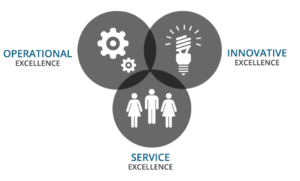It’s all about the conversations
When you’re managing or leading a team, it’s all about the conversations.
Some of my closest peers use the term ‘high frequency and high quality’ to describe the vital role of conversations with Team Members and that’s such a great way to put it.


 The challenge for Team Leaders is that they either don’t know about the many different kinds of conversations at their disposal or they haven’t grown confident in the use of the conversations.
The challenge for Team Leaders is that they either don’t know about the many different kinds of conversations at their disposal or they haven’t grown confident in the use of the conversations.
Some Team Leaders will tell you they don’t have time to have conversations with their Team Members which is a different challenge altogether.
There are many conversations in the Team Leader’s repertoire
Every Team Leader has a repertoire of conversations to choose from and use at the appropriate times and for the appropriate purposes.
In no particular order we share a few of these conversations here:
- Praise
- Gratitude
- Monthly Team Reviews
- Sincere & specific conversations about what went ‘right’
- Sincere & specific conversations about ‘what did not go right’
- Performance reviews
- Manager as ‘boss’
- Manager as ‘person
- Transactional coaching
- Individual monthly reviews
- Poor performance
- Personal advice (when asked for)
- Manager as ‘Leader’
There’s a lot to talk about.
So how can a Team Leader talk like a Leader?
The simple advice is actually quite practical and links specifically back to the organizational or departmental Vision, Mission & Values.
 Senior management wants the essence of the organization to cascade throughout every department and level.
Senior management wants the essence of the organization to cascade throughout every department and level.
So it can befrustrating for a CEO or VP of Customer Experience (etc.) to find that the folks answering the phone or serving at the Counter don’t have a basic understanding organizational goals, vision, mission and values.
While it’s to be expected that the senior folks incorporate organizational essence into their daily work, it often fails to appear in the conversations that take place between Team Leaders and the Frontline.
Vision, Mission & Values – this isn’t purely theoretical stuff
 When we teach the Vision, we help people understand that this is a point in time in the future (as in our organization aims to become…).
When we teach the Vision, we help people understand that this is a point in time in the future (as in our organization aims to become…).
Of course this is highly simplified for this article but still very clear.
In a recent class one of the students wanted to use Korean Airlines as a case study and here is their Vision:

To be a Respected Leader in the World Airline Community

While the calibre of the Vision Statement is open for discussion, we decided that this indeed represented a point of time in the future – a point in time when all the dreams of Korean Air would come true.
When we teach the Mission, we help people to understand that this is what we do ‘every day’.
For example, if we are a Call Centre, we may seek to listen and solve the enquiries of our Customers in a positive manner – and that’s something we do every day – not just on Mondays, Wednesdays and Fridays.
We then went to the Mission Statement for Korean Air which is:
Excellence in Flight

While the calibre of the Mission Statement is open for discussion, we decided that excellence in flight was something that was supposed to happen ‘every day’.
We then went to Zappos to visit a few of their well-known Core Values – 3 of which are listed below:
Core values are supposed to guide our behaviour at work and when well designed they can be very inspirational.
So what do we mean by the Language of Leadership?
Cindy – I really liked the way you incorporated empathy into your email to Mr. Lawrence. That supports our mission to provide excellent service ‘every day’.
Tom – one of our core values is Teamwork – and by staying back last night to help Tanya finish her report on time you helped bring that value to life. Thanks Tom.
Alex, for the next Guest who checks in, be sure to remember to ask them if they have their loyalty card so that they can enjoy the additional benefits of staying with us – that supports our vision to be the most trusted provider of hospitality solutions for our Guests.
It’s a terrific moment when Team Leaders begin to speak like leaders.
In closing
Managing people well involves having a lot of different types of timely and effective conversations with them.
And every potential conversation in the repertoire has its own purpose.
But to speak like a leader, just look to your organizational and departmental vision, mission and values and aim to bring them to life in your conversations with others.
Thank you for reading!
Daniel


